Business Research Report: An Analysis of IBM Outsourcing Strategies
VerifiedAdded on 2020/03/01
|16
|3001
|456
Report
AI Summary
This business research report provides a comprehensive analysis of IBM's outsourcing strategies. It delves into the core concepts of outsourcing, its benefits like cost reduction, expert performance, and focus on core activities, as well as the disadvantages, including lack of managerial control, potential for data leaks, and the impact of language barriers. The report examines IBM's specific outsourcing practices, particularly in IT services, and evaluates its impact on the company's performance. It presents a literature review, discusses the project objectives and scope, and draws conclusions based on the analysis of IBM's outsourcing model, including the effects on its business, return on assets, and operational expenses. The report includes figures and references to support its findings, offering a detailed overview of the outsourcing landscape from IBM's perspective.
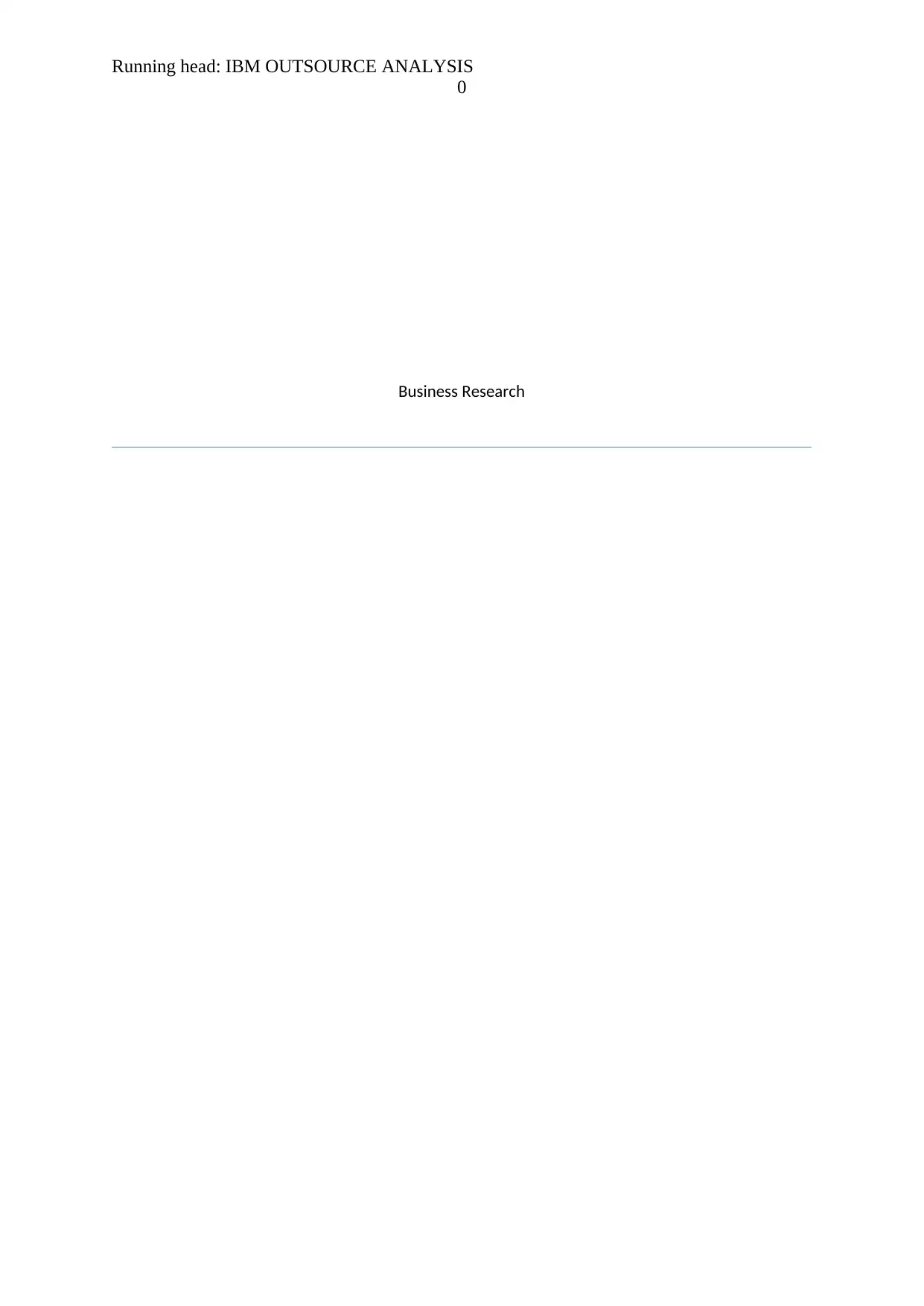
Running head: IBM OUTSOURCE ANALYSIS
0
Business Research
0
Business Research
Paraphrase This Document
Need a fresh take? Get an instant paraphrase of this document with our AI Paraphraser
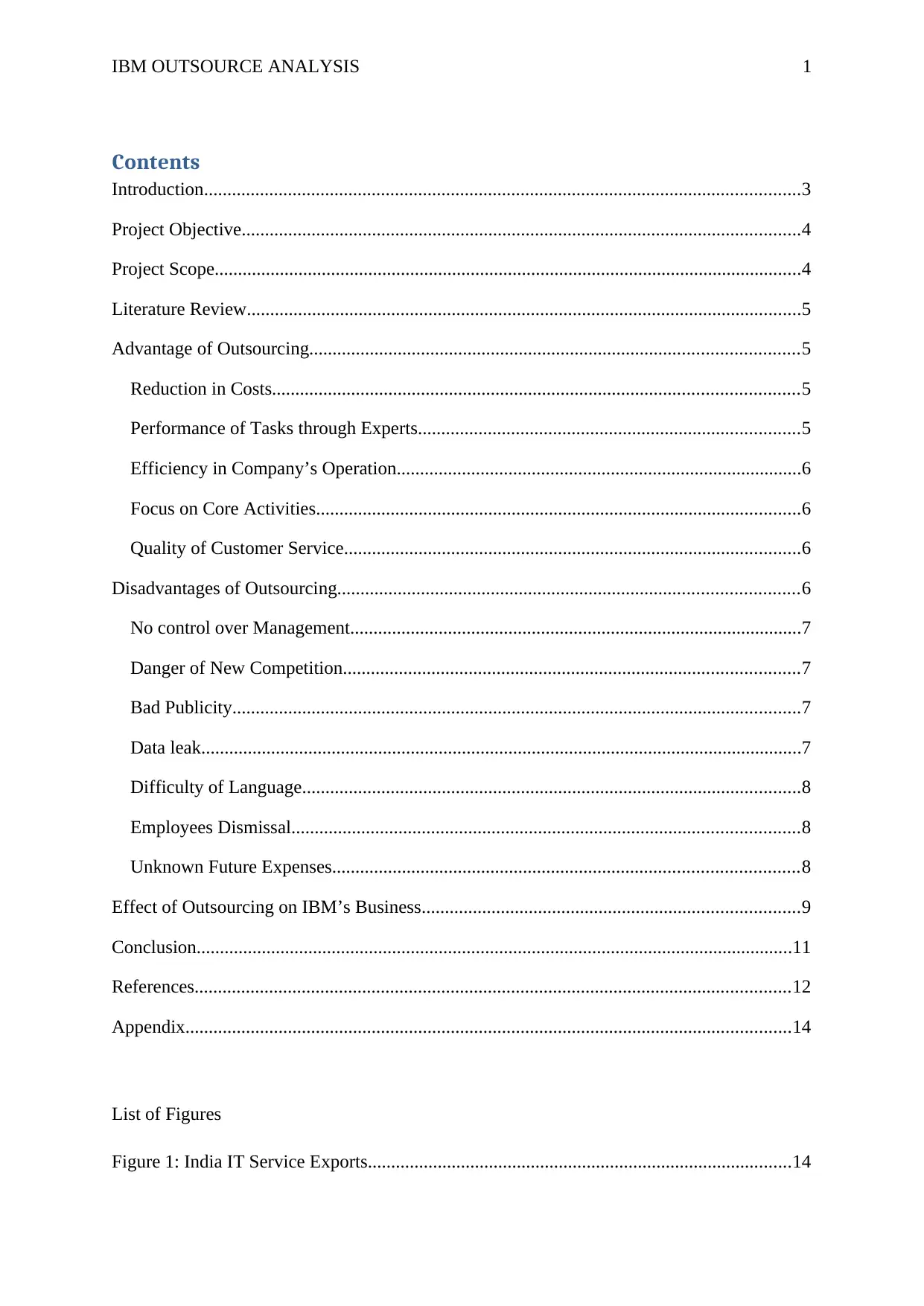
IBM OUTSOURCE ANALYSIS 1
Contents
Introduction................................................................................................................................3
Project Objective........................................................................................................................4
Project Scope..............................................................................................................................4
Literature Review.......................................................................................................................5
Advantage of Outsourcing.........................................................................................................5
Reduction in Costs.................................................................................................................5
Performance of Tasks through Experts..................................................................................5
Efficiency in Company’s Operation.......................................................................................6
Focus on Core Activities........................................................................................................6
Quality of Customer Service..................................................................................................6
Disadvantages of Outsourcing...................................................................................................6
No control over Management.................................................................................................7
Danger of New Competition..................................................................................................7
Bad Publicity..........................................................................................................................7
Data leak.................................................................................................................................7
Difficulty of Language...........................................................................................................8
Employees Dismissal.............................................................................................................8
Unknown Future Expenses....................................................................................................8
Effect of Outsourcing on IBM’s Business.................................................................................9
Conclusion................................................................................................................................11
References................................................................................................................................12
Appendix..................................................................................................................................14
List of Figures
Figure 1: India IT Service Exports...........................................................................................14
Contents
Introduction................................................................................................................................3
Project Objective........................................................................................................................4
Project Scope..............................................................................................................................4
Literature Review.......................................................................................................................5
Advantage of Outsourcing.........................................................................................................5
Reduction in Costs.................................................................................................................5
Performance of Tasks through Experts..................................................................................5
Efficiency in Company’s Operation.......................................................................................6
Focus on Core Activities........................................................................................................6
Quality of Customer Service..................................................................................................6
Disadvantages of Outsourcing...................................................................................................6
No control over Management.................................................................................................7
Danger of New Competition..................................................................................................7
Bad Publicity..........................................................................................................................7
Data leak.................................................................................................................................7
Difficulty of Language...........................................................................................................8
Employees Dismissal.............................................................................................................8
Unknown Future Expenses....................................................................................................8
Effect of Outsourcing on IBM’s Business.................................................................................9
Conclusion................................................................................................................................11
References................................................................................................................................12
Appendix..................................................................................................................................14
List of Figures
Figure 1: India IT Service Exports...........................................................................................14

IBM OUTSOURCE ANALYSIS 2
Figure 2: IBM Outsourcing Market.........................................................................................14
Figure 2: IBM Outsourcing Market.........................................................................................14
⊘ This is a preview!⊘
Do you want full access?
Subscribe today to unlock all pages.

Trusted by 1+ million students worldwide
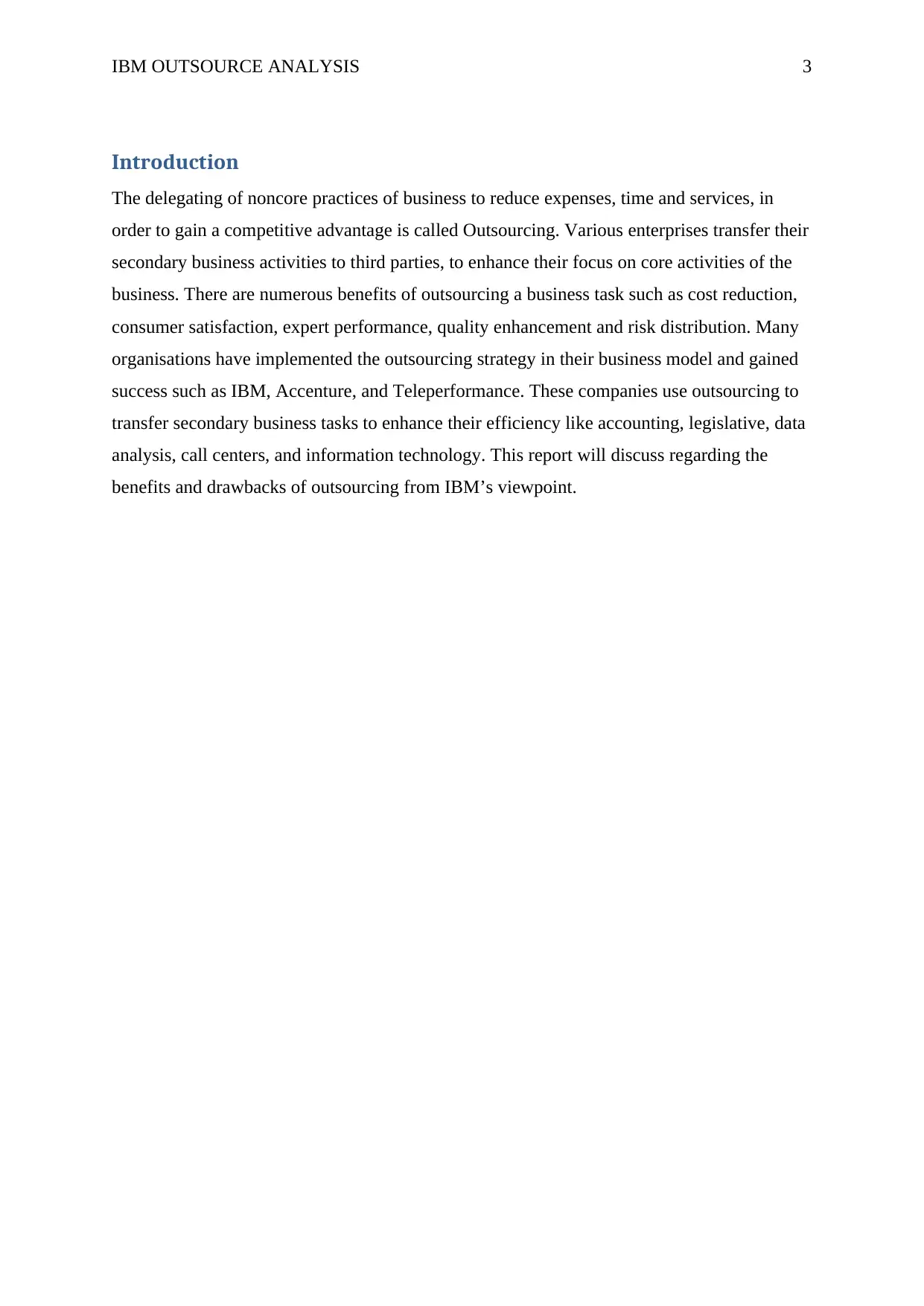
IBM OUTSOURCE ANALYSIS 3
Introduction
The delegating of noncore practices of business to reduce expenses, time and services, in
order to gain a competitive advantage is called Outsourcing. Various enterprises transfer their
secondary business activities to third parties, to enhance their focus on core activities of the
business. There are numerous benefits of outsourcing a business task such as cost reduction,
consumer satisfaction, expert performance, quality enhancement and risk distribution. Many
organisations have implemented the outsourcing strategy in their business model and gained
success such as IBM, Accenture, and Teleperformance. These companies use outsourcing to
transfer secondary business tasks to enhance their efficiency like accounting, legislative, data
analysis, call centers, and information technology. This report will discuss regarding the
benefits and drawbacks of outsourcing from IBM’s viewpoint.
Introduction
The delegating of noncore practices of business to reduce expenses, time and services, in
order to gain a competitive advantage is called Outsourcing. Various enterprises transfer their
secondary business activities to third parties, to enhance their focus on core activities of the
business. There are numerous benefits of outsourcing a business task such as cost reduction,
consumer satisfaction, expert performance, quality enhancement and risk distribution. Many
organisations have implemented the outsourcing strategy in their business model and gained
success such as IBM, Accenture, and Teleperformance. These companies use outsourcing to
transfer secondary business tasks to enhance their efficiency like accounting, legislative, data
analysis, call centers, and information technology. This report will discuss regarding the
benefits and drawbacks of outsourcing from IBM’s viewpoint.
Paraphrase This Document
Need a fresh take? Get an instant paraphrase of this document with our AI Paraphraser
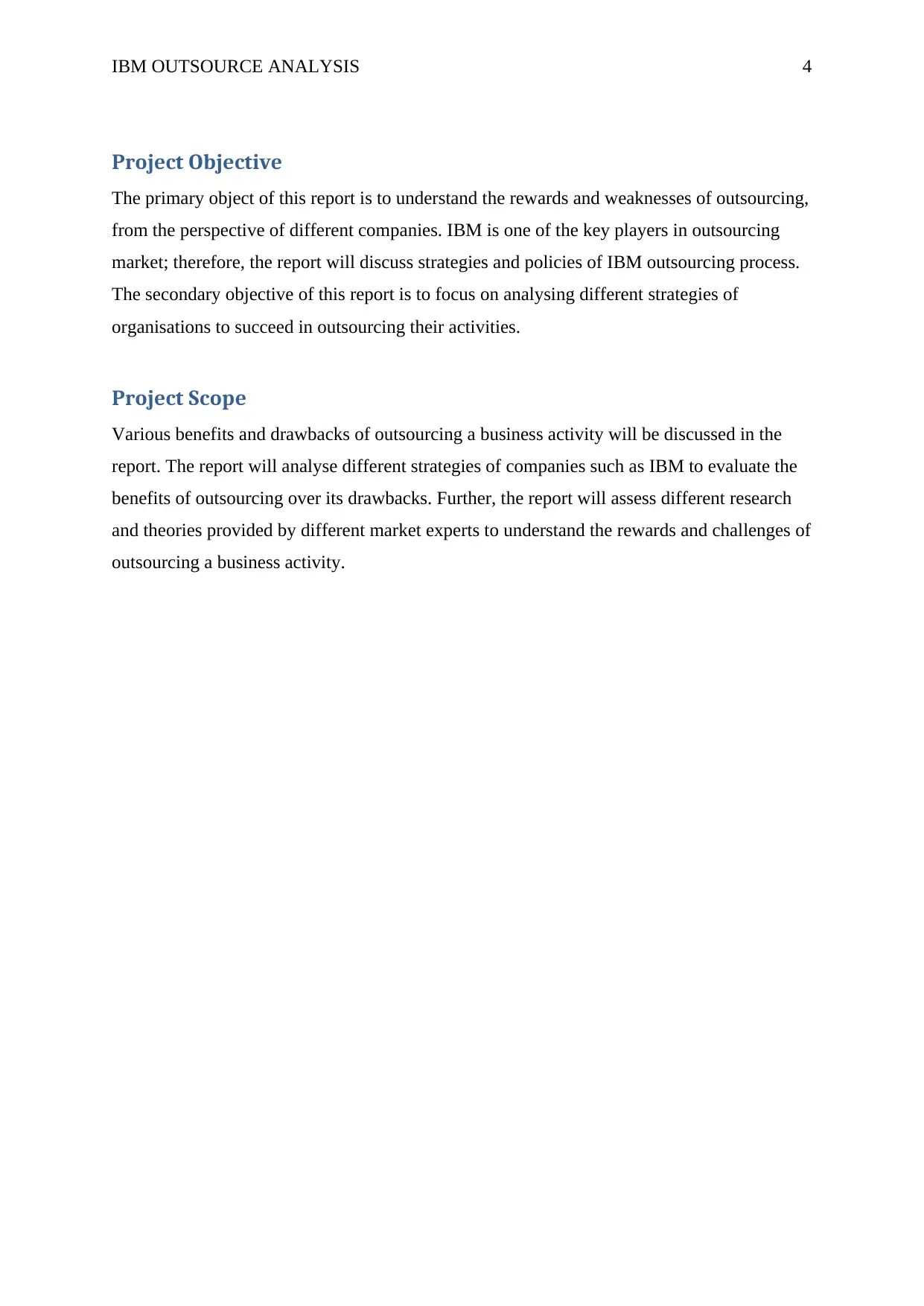
IBM OUTSOURCE ANALYSIS 4
Project Objective
The primary object of this report is to understand the rewards and weaknesses of outsourcing,
from the perspective of different companies. IBM is one of the key players in outsourcing
market; therefore, the report will discuss strategies and policies of IBM outsourcing process.
The secondary objective of this report is to focus on analysing different strategies of
organisations to succeed in outsourcing their activities.
Project Scope
Various benefits and drawbacks of outsourcing a business activity will be discussed in the
report. The report will analyse different strategies of companies such as IBM to evaluate the
benefits of outsourcing over its drawbacks. Further, the report will assess different research
and theories provided by different market experts to understand the rewards and challenges of
outsourcing a business activity.
Project Objective
The primary object of this report is to understand the rewards and weaknesses of outsourcing,
from the perspective of different companies. IBM is one of the key players in outsourcing
market; therefore, the report will discuss strategies and policies of IBM outsourcing process.
The secondary objective of this report is to focus on analysing different strategies of
organisations to succeed in outsourcing their activities.
Project Scope
Various benefits and drawbacks of outsourcing a business activity will be discussed in the
report. The report will analyse different strategies of companies such as IBM to evaluate the
benefits of outsourcing over its drawbacks. Further, the report will assess different research
and theories provided by different market experts to understand the rewards and challenges of
outsourcing a business activity.
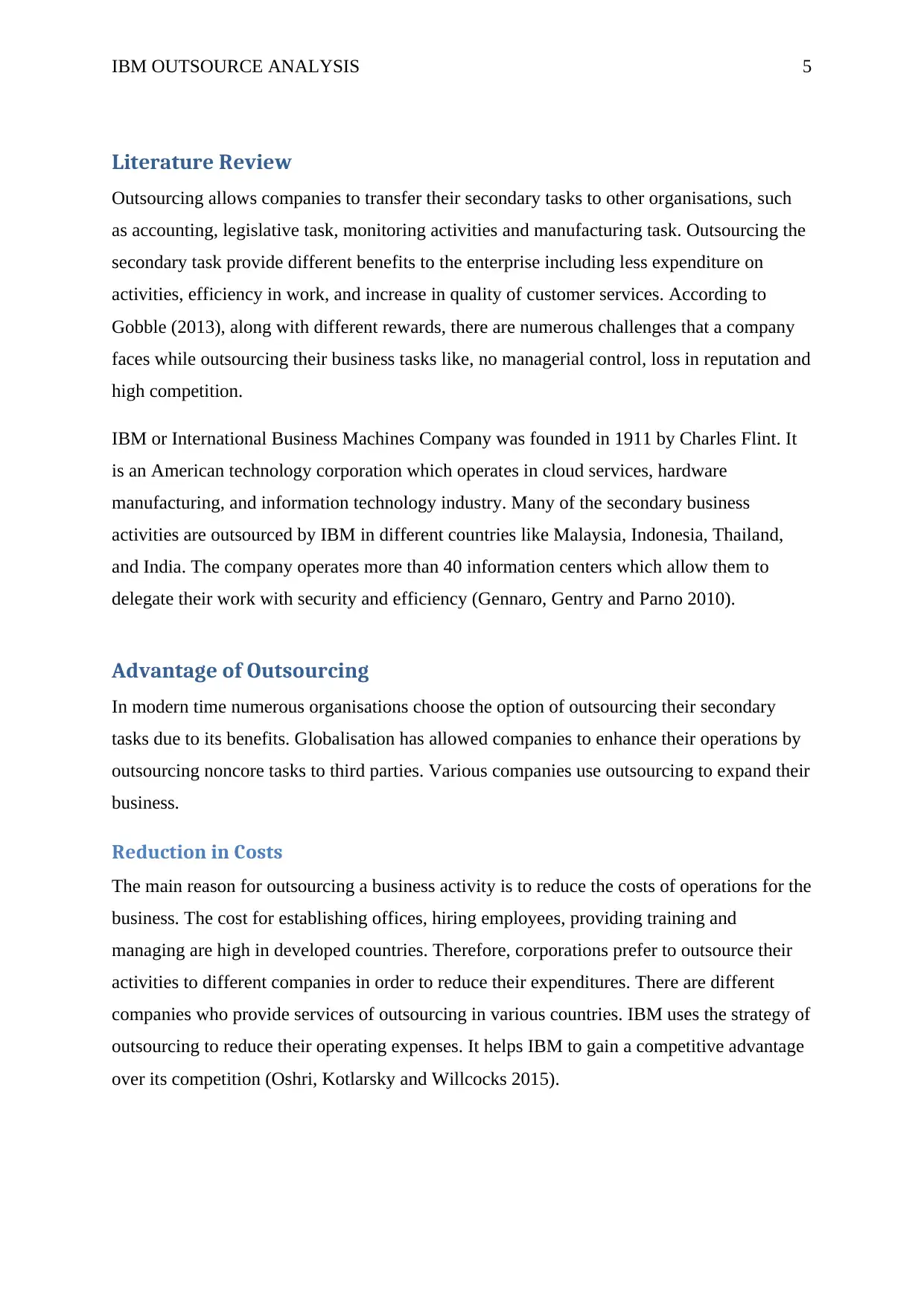
IBM OUTSOURCE ANALYSIS 5
Literature Review
Outsourcing allows companies to transfer their secondary tasks to other organisations, such
as accounting, legislative task, monitoring activities and manufacturing task. Outsourcing the
secondary task provide different benefits to the enterprise including less expenditure on
activities, efficiency in work, and increase in quality of customer services. According to
Gobble (2013), along with different rewards, there are numerous challenges that a company
faces while outsourcing their business tasks like, no managerial control, loss in reputation and
high competition.
IBM or International Business Machines Company was founded in 1911 by Charles Flint. It
is an American technology corporation which operates in cloud services, hardware
manufacturing, and information technology industry. Many of the secondary business
activities are outsourced by IBM in different countries like Malaysia, Indonesia, Thailand,
and India. The company operates more than 40 information centers which allow them to
delegate their work with security and efficiency (Gennaro, Gentry and Parno 2010).
Advantage of Outsourcing
In modern time numerous organisations choose the option of outsourcing their secondary
tasks due to its benefits. Globalisation has allowed companies to enhance their operations by
outsourcing noncore tasks to third parties. Various companies use outsourcing to expand their
business.
Reduction in Costs
The main reason for outsourcing a business activity is to reduce the costs of operations for the
business. The cost for establishing offices, hiring employees, providing training and
managing are high in developed countries. Therefore, corporations prefer to outsource their
activities to different companies in order to reduce their expenditures. There are different
companies who provide services of outsourcing in various countries. IBM uses the strategy of
outsourcing to reduce their operating expenses. It helps IBM to gain a competitive advantage
over its competition (Oshri, Kotlarsky and Willcocks 2015).
Literature Review
Outsourcing allows companies to transfer their secondary tasks to other organisations, such
as accounting, legislative task, monitoring activities and manufacturing task. Outsourcing the
secondary task provide different benefits to the enterprise including less expenditure on
activities, efficiency in work, and increase in quality of customer services. According to
Gobble (2013), along with different rewards, there are numerous challenges that a company
faces while outsourcing their business tasks like, no managerial control, loss in reputation and
high competition.
IBM or International Business Machines Company was founded in 1911 by Charles Flint. It
is an American technology corporation which operates in cloud services, hardware
manufacturing, and information technology industry. Many of the secondary business
activities are outsourced by IBM in different countries like Malaysia, Indonesia, Thailand,
and India. The company operates more than 40 information centers which allow them to
delegate their work with security and efficiency (Gennaro, Gentry and Parno 2010).
Advantage of Outsourcing
In modern time numerous organisations choose the option of outsourcing their secondary
tasks due to its benefits. Globalisation has allowed companies to enhance their operations by
outsourcing noncore tasks to third parties. Various companies use outsourcing to expand their
business.
Reduction in Costs
The main reason for outsourcing a business activity is to reduce the costs of operations for the
business. The cost for establishing offices, hiring employees, providing training and
managing are high in developed countries. Therefore, corporations prefer to outsource their
activities to different companies in order to reduce their expenditures. There are different
companies who provide services of outsourcing in various countries. IBM uses the strategy of
outsourcing to reduce their operating expenses. It helps IBM to gain a competitive advantage
over its competition (Oshri, Kotlarsky and Willcocks 2015).
⊘ This is a preview!⊘
Do you want full access?
Subscribe today to unlock all pages.

Trusted by 1+ million students worldwide
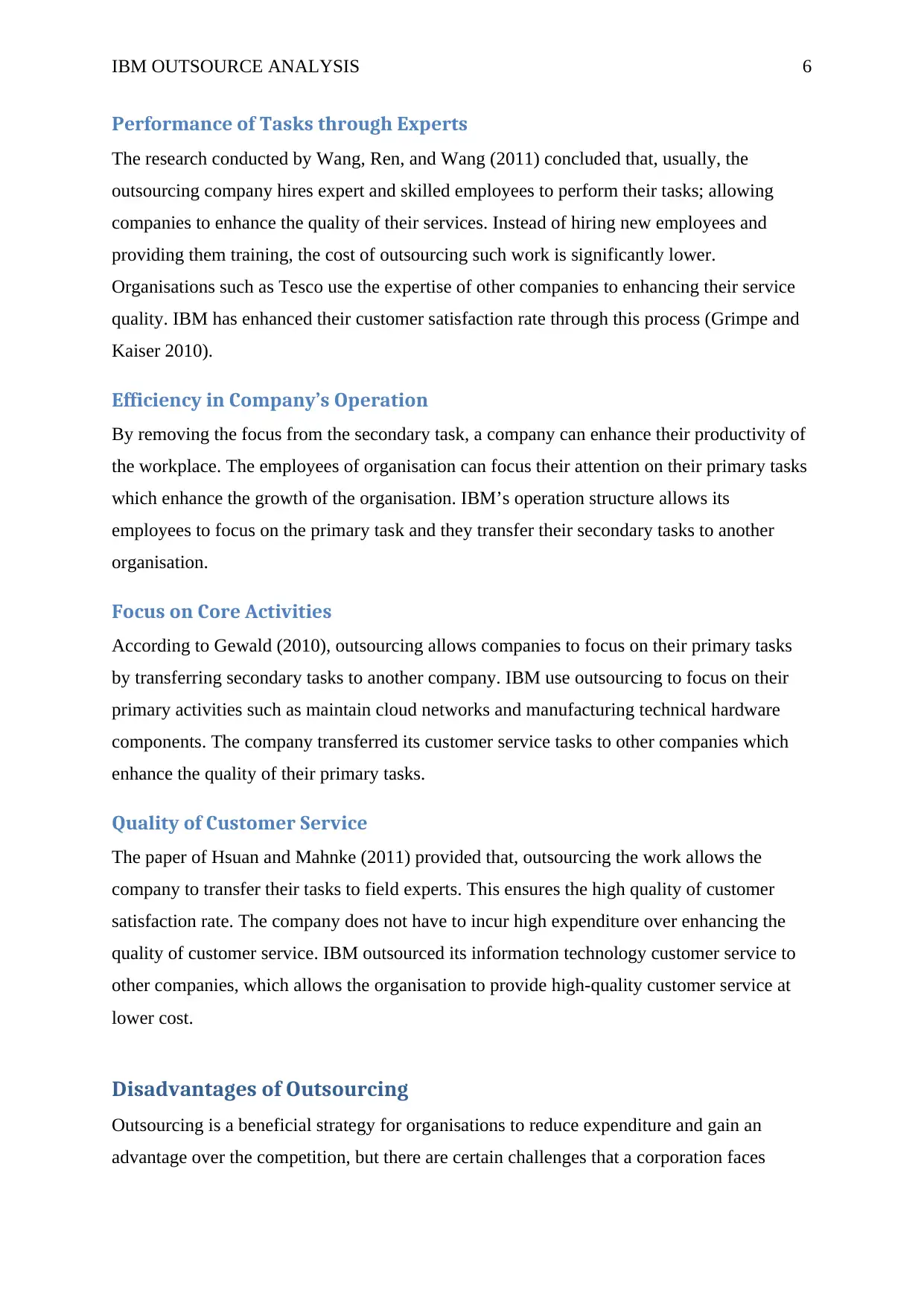
IBM OUTSOURCE ANALYSIS 6
Performance of Tasks through Experts
The research conducted by Wang, Ren, and Wang (2011) concluded that, usually, the
outsourcing company hires expert and skilled employees to perform their tasks; allowing
companies to enhance the quality of their services. Instead of hiring new employees and
providing them training, the cost of outsourcing such work is significantly lower.
Organisations such as Tesco use the expertise of other companies to enhancing their service
quality. IBM has enhanced their customer satisfaction rate through this process (Grimpe and
Kaiser 2010).
Efficiency in Company’s Operation
By removing the focus from the secondary task, a company can enhance their productivity of
the workplace. The employees of organisation can focus their attention on their primary tasks
which enhance the growth of the organisation. IBM’s operation structure allows its
employees to focus on the primary task and they transfer their secondary tasks to another
organisation.
Focus on Core Activities
According to Gewald (2010), outsourcing allows companies to focus on their primary tasks
by transferring secondary tasks to another company. IBM use outsourcing to focus on their
primary activities such as maintain cloud networks and manufacturing technical hardware
components. The company transferred its customer service tasks to other companies which
enhance the quality of their primary tasks.
Quality of Customer Service
The paper of Hsuan and Mahnke (2011) provided that, outsourcing the work allows the
company to transfer their tasks to field experts. This ensures the high quality of customer
satisfaction rate. The company does not have to incur high expenditure over enhancing the
quality of customer service. IBM outsourced its information technology customer service to
other companies, which allows the organisation to provide high-quality customer service at
lower cost.
Disadvantages of Outsourcing
Outsourcing is a beneficial strategy for organisations to reduce expenditure and gain an
advantage over the competition, but there are certain challenges that a corporation faces
Performance of Tasks through Experts
The research conducted by Wang, Ren, and Wang (2011) concluded that, usually, the
outsourcing company hires expert and skilled employees to perform their tasks; allowing
companies to enhance the quality of their services. Instead of hiring new employees and
providing them training, the cost of outsourcing such work is significantly lower.
Organisations such as Tesco use the expertise of other companies to enhancing their service
quality. IBM has enhanced their customer satisfaction rate through this process (Grimpe and
Kaiser 2010).
Efficiency in Company’s Operation
By removing the focus from the secondary task, a company can enhance their productivity of
the workplace. The employees of organisation can focus their attention on their primary tasks
which enhance the growth of the organisation. IBM’s operation structure allows its
employees to focus on the primary task and they transfer their secondary tasks to another
organisation.
Focus on Core Activities
According to Gewald (2010), outsourcing allows companies to focus on their primary tasks
by transferring secondary tasks to another company. IBM use outsourcing to focus on their
primary activities such as maintain cloud networks and manufacturing technical hardware
components. The company transferred its customer service tasks to other companies which
enhance the quality of their primary tasks.
Quality of Customer Service
The paper of Hsuan and Mahnke (2011) provided that, outsourcing the work allows the
company to transfer their tasks to field experts. This ensures the high quality of customer
satisfaction rate. The company does not have to incur high expenditure over enhancing the
quality of customer service. IBM outsourced its information technology customer service to
other companies, which allows the organisation to provide high-quality customer service at
lower cost.
Disadvantages of Outsourcing
Outsourcing is a beneficial strategy for organisations to reduce expenditure and gain an
advantage over the competition, but there are certain challenges that a corporation faces
Paraphrase This Document
Need a fresh take? Get an instant paraphrase of this document with our AI Paraphraser
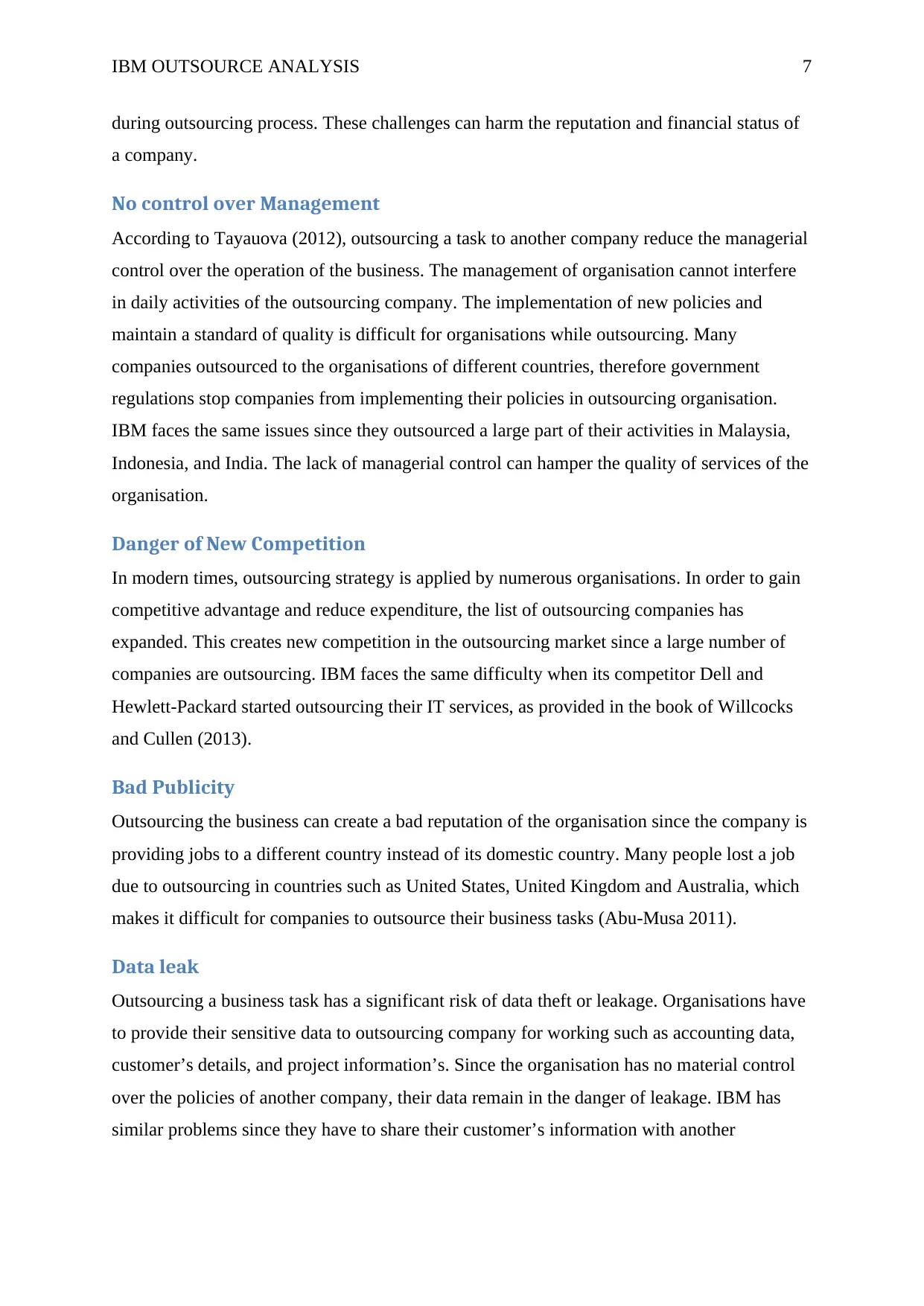
IBM OUTSOURCE ANALYSIS 7
during outsourcing process. These challenges can harm the reputation and financial status of
a company.
No control over Management
According to Tayauova (2012), outsourcing a task to another company reduce the managerial
control over the operation of the business. The management of organisation cannot interfere
in daily activities of the outsourcing company. The implementation of new policies and
maintain a standard of quality is difficult for organisations while outsourcing. Many
companies outsourced to the organisations of different countries, therefore government
regulations stop companies from implementing their policies in outsourcing organisation.
IBM faces the same issues since they outsourced a large part of their activities in Malaysia,
Indonesia, and India. The lack of managerial control can hamper the quality of services of the
organisation.
Danger of New Competition
In modern times, outsourcing strategy is applied by numerous organisations. In order to gain
competitive advantage and reduce expenditure, the list of outsourcing companies has
expanded. This creates new competition in the outsourcing market since a large number of
companies are outsourcing. IBM faces the same difficulty when its competitor Dell and
Hewlett-Packard started outsourcing their IT services, as provided in the book of Willcocks
and Cullen (2013).
Bad Publicity
Outsourcing the business can create a bad reputation of the organisation since the company is
providing jobs to a different country instead of its domestic country. Many people lost a job
due to outsourcing in countries such as United States, United Kingdom and Australia, which
makes it difficult for companies to outsource their business tasks (Abu-Musa 2011).
Data leak
Outsourcing a business task has a significant risk of data theft or leakage. Organisations have
to provide their sensitive data to outsourcing company for working such as accounting data,
customer’s details, and project information’s. Since the organisation has no material control
over the policies of another company, their data remain in the danger of leakage. IBM has
similar problems since they have to share their customer’s information with another
during outsourcing process. These challenges can harm the reputation and financial status of
a company.
No control over Management
According to Tayauova (2012), outsourcing a task to another company reduce the managerial
control over the operation of the business. The management of organisation cannot interfere
in daily activities of the outsourcing company. The implementation of new policies and
maintain a standard of quality is difficult for organisations while outsourcing. Many
companies outsourced to the organisations of different countries, therefore government
regulations stop companies from implementing their policies in outsourcing organisation.
IBM faces the same issues since they outsourced a large part of their activities in Malaysia,
Indonesia, and India. The lack of managerial control can hamper the quality of services of the
organisation.
Danger of New Competition
In modern times, outsourcing strategy is applied by numerous organisations. In order to gain
competitive advantage and reduce expenditure, the list of outsourcing companies has
expanded. This creates new competition in the outsourcing market since a large number of
companies are outsourcing. IBM faces the same difficulty when its competitor Dell and
Hewlett-Packard started outsourcing their IT services, as provided in the book of Willcocks
and Cullen (2013).
Bad Publicity
Outsourcing the business can create a bad reputation of the organisation since the company is
providing jobs to a different country instead of its domestic country. Many people lost a job
due to outsourcing in countries such as United States, United Kingdom and Australia, which
makes it difficult for companies to outsource their business tasks (Abu-Musa 2011).
Data leak
Outsourcing a business task has a significant risk of data theft or leakage. Organisations have
to provide their sensitive data to outsourcing company for working such as accounting data,
customer’s details, and project information’s. Since the organisation has no material control
over the policies of another company, their data remain in the danger of leakage. IBM has
similar problems since they have to share their customer’s information with another
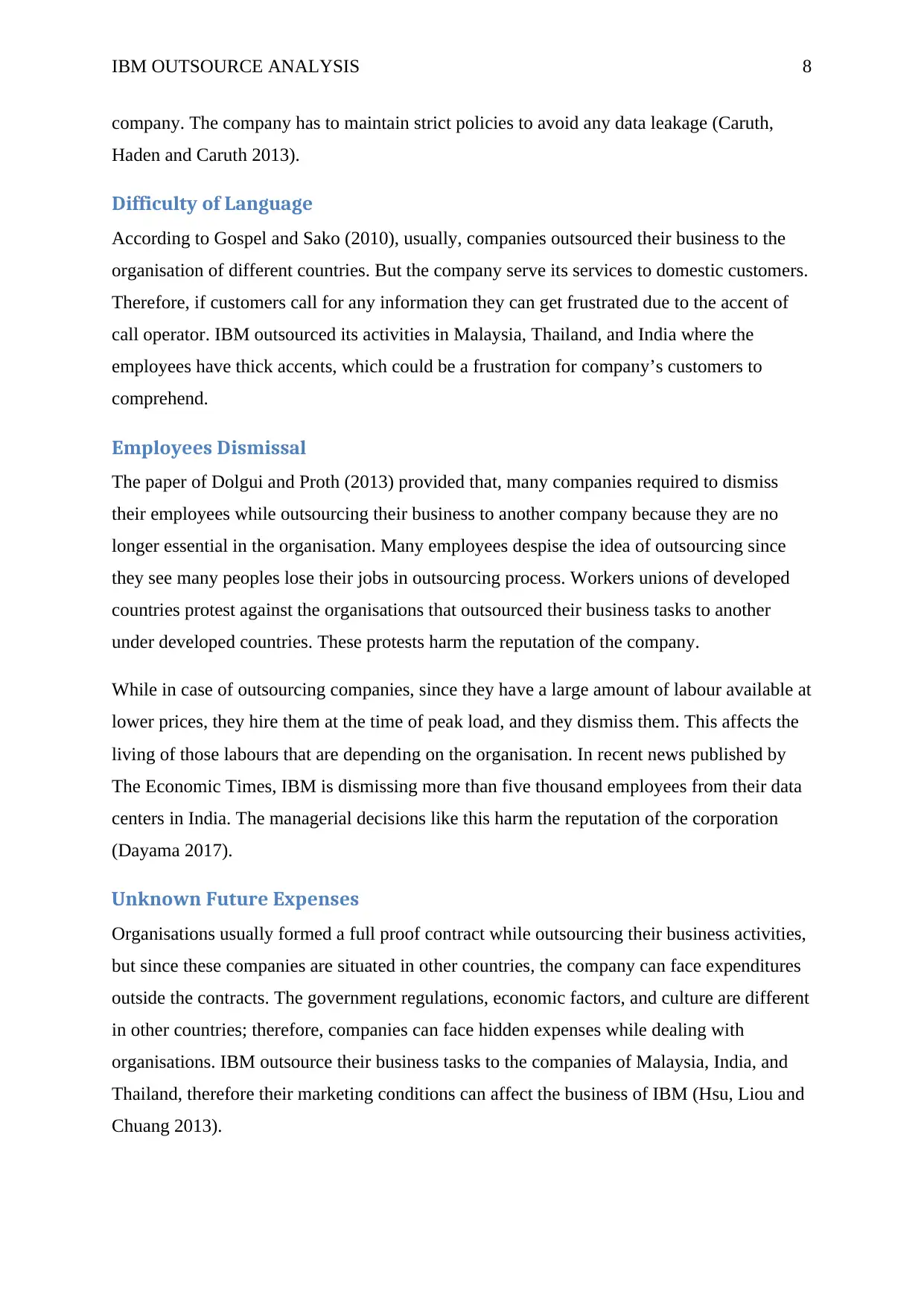
IBM OUTSOURCE ANALYSIS 8
company. The company has to maintain strict policies to avoid any data leakage (Caruth,
Haden and Caruth 2013).
Difficulty of Language
According to Gospel and Sako (2010), usually, companies outsourced their business to the
organisation of different countries. But the company serve its services to domestic customers.
Therefore, if customers call for any information they can get frustrated due to the accent of
call operator. IBM outsourced its activities in Malaysia, Thailand, and India where the
employees have thick accents, which could be a frustration for company’s customers to
comprehend.
Employees Dismissal
The paper of Dolgui and Proth (2013) provided that, many companies required to dismiss
their employees while outsourcing their business to another company because they are no
longer essential in the organisation. Many employees despise the idea of outsourcing since
they see many peoples lose their jobs in outsourcing process. Workers unions of developed
countries protest against the organisations that outsourced their business tasks to another
under developed countries. These protests harm the reputation of the company.
While in case of outsourcing companies, since they have a large amount of labour available at
lower prices, they hire them at the time of peak load, and they dismiss them. This affects the
living of those labours that are depending on the organisation. In recent news published by
The Economic Times, IBM is dismissing more than five thousand employees from their data
centers in India. The managerial decisions like this harm the reputation of the corporation
(Dayama 2017).
Unknown Future Expenses
Organisations usually formed a full proof contract while outsourcing their business activities,
but since these companies are situated in other countries, the company can face expenditures
outside the contracts. The government regulations, economic factors, and culture are different
in other countries; therefore, companies can face hidden expenses while dealing with
organisations. IBM outsource their business tasks to the companies of Malaysia, India, and
Thailand, therefore their marketing conditions can affect the business of IBM (Hsu, Liou and
Chuang 2013).
company. The company has to maintain strict policies to avoid any data leakage (Caruth,
Haden and Caruth 2013).
Difficulty of Language
According to Gospel and Sako (2010), usually, companies outsourced their business to the
organisation of different countries. But the company serve its services to domestic customers.
Therefore, if customers call for any information they can get frustrated due to the accent of
call operator. IBM outsourced its activities in Malaysia, Thailand, and India where the
employees have thick accents, which could be a frustration for company’s customers to
comprehend.
Employees Dismissal
The paper of Dolgui and Proth (2013) provided that, many companies required to dismiss
their employees while outsourcing their business to another company because they are no
longer essential in the organisation. Many employees despise the idea of outsourcing since
they see many peoples lose their jobs in outsourcing process. Workers unions of developed
countries protest against the organisations that outsourced their business tasks to another
under developed countries. These protests harm the reputation of the company.
While in case of outsourcing companies, since they have a large amount of labour available at
lower prices, they hire them at the time of peak load, and they dismiss them. This affects the
living of those labours that are depending on the organisation. In recent news published by
The Economic Times, IBM is dismissing more than five thousand employees from their data
centers in India. The managerial decisions like this harm the reputation of the corporation
(Dayama 2017).
Unknown Future Expenses
Organisations usually formed a full proof contract while outsourcing their business activities,
but since these companies are situated in other countries, the company can face expenditures
outside the contracts. The government regulations, economic factors, and culture are different
in other countries; therefore, companies can face hidden expenses while dealing with
organisations. IBM outsource their business tasks to the companies of Malaysia, India, and
Thailand, therefore their marketing conditions can affect the business of IBM (Hsu, Liou and
Chuang 2013).
⊘ This is a preview!⊘
Do you want full access?
Subscribe today to unlock all pages.

Trusted by 1+ million students worldwide
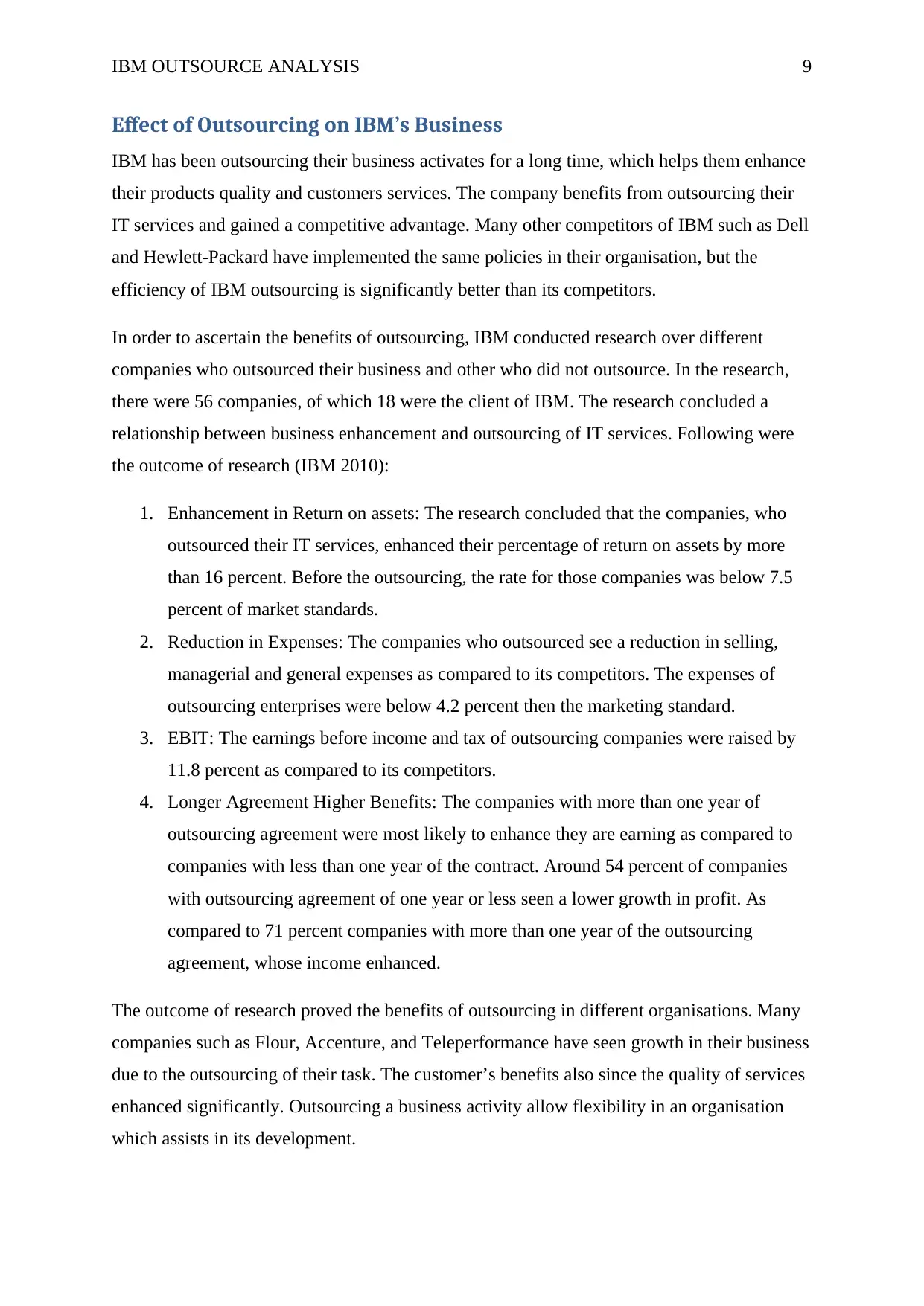
IBM OUTSOURCE ANALYSIS 9
Effect of Outsourcing on IBM’s Business
IBM has been outsourcing their business activates for a long time, which helps them enhance
their products quality and customers services. The company benefits from outsourcing their
IT services and gained a competitive advantage. Many other competitors of IBM such as Dell
and Hewlett-Packard have implemented the same policies in their organisation, but the
efficiency of IBM outsourcing is significantly better than its competitors.
In order to ascertain the benefits of outsourcing, IBM conducted research over different
companies who outsourced their business and other who did not outsource. In the research,
there were 56 companies, of which 18 were the client of IBM. The research concluded a
relationship between business enhancement and outsourcing of IT services. Following were
the outcome of research (IBM 2010):
1. Enhancement in Return on assets: The research concluded that the companies, who
outsourced their IT services, enhanced their percentage of return on assets by more
than 16 percent. Before the outsourcing, the rate for those companies was below 7.5
percent of market standards.
2. Reduction in Expenses: The companies who outsourced see a reduction in selling,
managerial and general expenses as compared to its competitors. The expenses of
outsourcing enterprises were below 4.2 percent then the marketing standard.
3. EBIT: The earnings before income and tax of outsourcing companies were raised by
11.8 percent as compared to its competitors.
4. Longer Agreement Higher Benefits: The companies with more than one year of
outsourcing agreement were most likely to enhance they are earning as compared to
companies with less than one year of the contract. Around 54 percent of companies
with outsourcing agreement of one year or less seen a lower growth in profit. As
compared to 71 percent companies with more than one year of the outsourcing
agreement, whose income enhanced.
The outcome of research proved the benefits of outsourcing in different organisations. Many
companies such as Flour, Accenture, and Teleperformance have seen growth in their business
due to the outsourcing of their task. The customer’s benefits also since the quality of services
enhanced significantly. Outsourcing a business activity allow flexibility in an organisation
which assists in its development.
Effect of Outsourcing on IBM’s Business
IBM has been outsourcing their business activates for a long time, which helps them enhance
their products quality and customers services. The company benefits from outsourcing their
IT services and gained a competitive advantage. Many other competitors of IBM such as Dell
and Hewlett-Packard have implemented the same policies in their organisation, but the
efficiency of IBM outsourcing is significantly better than its competitors.
In order to ascertain the benefits of outsourcing, IBM conducted research over different
companies who outsourced their business and other who did not outsource. In the research,
there were 56 companies, of which 18 were the client of IBM. The research concluded a
relationship between business enhancement and outsourcing of IT services. Following were
the outcome of research (IBM 2010):
1. Enhancement in Return on assets: The research concluded that the companies, who
outsourced their IT services, enhanced their percentage of return on assets by more
than 16 percent. Before the outsourcing, the rate for those companies was below 7.5
percent of market standards.
2. Reduction in Expenses: The companies who outsourced see a reduction in selling,
managerial and general expenses as compared to its competitors. The expenses of
outsourcing enterprises were below 4.2 percent then the marketing standard.
3. EBIT: The earnings before income and tax of outsourcing companies were raised by
11.8 percent as compared to its competitors.
4. Longer Agreement Higher Benefits: The companies with more than one year of
outsourcing agreement were most likely to enhance they are earning as compared to
companies with less than one year of the contract. Around 54 percent of companies
with outsourcing agreement of one year or less seen a lower growth in profit. As
compared to 71 percent companies with more than one year of the outsourcing
agreement, whose income enhanced.
The outcome of research proved the benefits of outsourcing in different organisations. Many
companies such as Flour, Accenture, and Teleperformance have seen growth in their business
due to the outsourcing of their task. The customer’s benefits also since the quality of services
enhanced significantly. Outsourcing a business activity allow flexibility in an organisation
which assists in its development.
Paraphrase This Document
Need a fresh take? Get an instant paraphrase of this document with our AI Paraphraser

IBM OUTSOURCE ANALYSIS 10
IBM has successfully implemented the outsourcing strategy in their business model, which
allows them to enhance their growth. The company provides a high level of facilities to its
customers and the flexibility allows them to focus on their core activities. The enterprise
provides a quality work environment to its employees which enhance their productivity. The
outsourcing strategy allows IBM to gain competitive advantage and sustained their future
growth.
IBM has successfully implemented the outsourcing strategy in their business model, which
allows them to enhance their growth. The company provides a high level of facilities to its
customers and the flexibility allows them to focus on their core activities. The enterprise
provides a quality work environment to its employees which enhance their productivity. The
outsourcing strategy allows IBM to gain competitive advantage and sustained their future
growth.
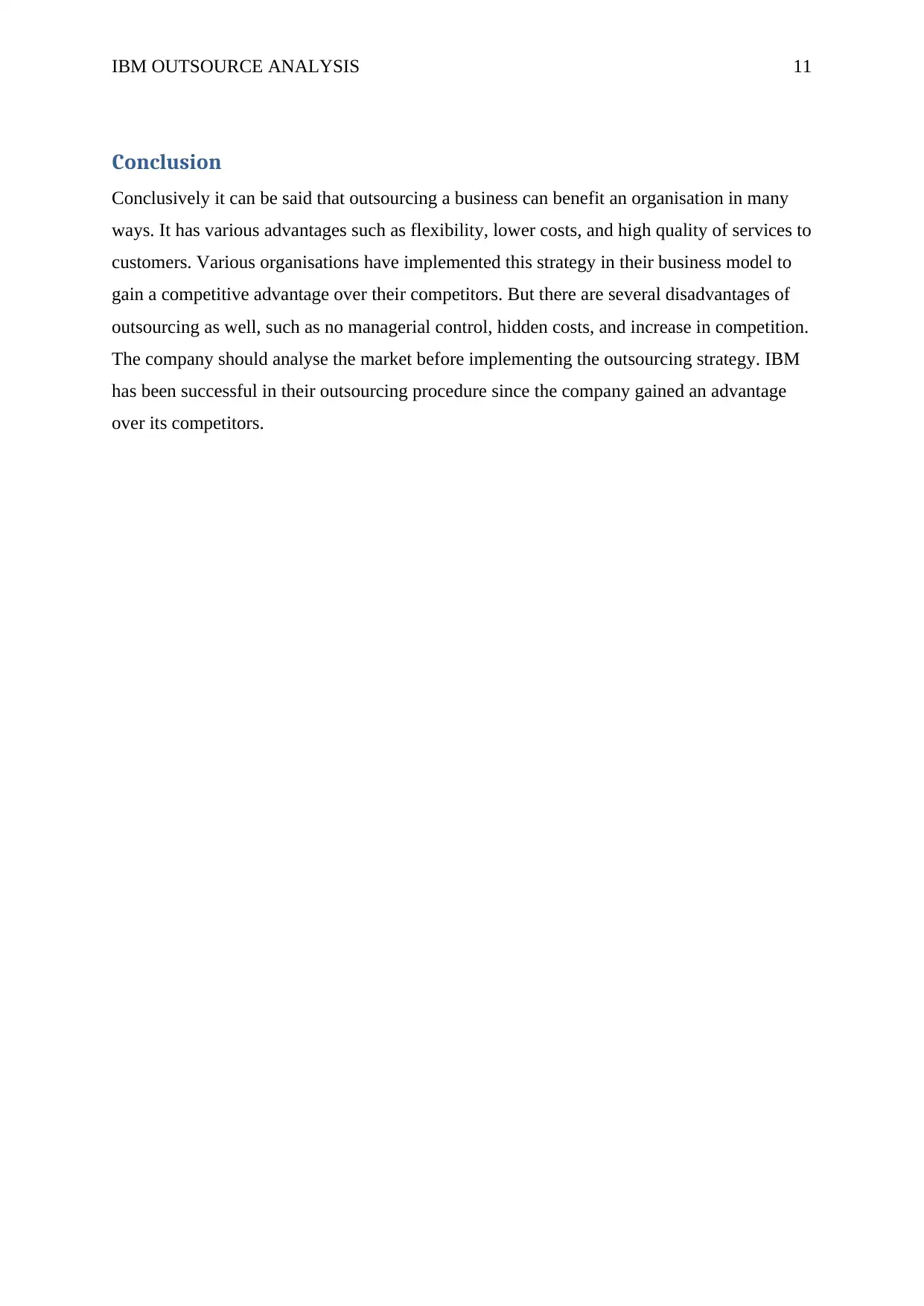
IBM OUTSOURCE ANALYSIS 11
Conclusion
Conclusively it can be said that outsourcing a business can benefit an organisation in many
ways. It has various advantages such as flexibility, lower costs, and high quality of services to
customers. Various organisations have implemented this strategy in their business model to
gain a competitive advantage over their competitors. But there are several disadvantages of
outsourcing as well, such as no managerial control, hidden costs, and increase in competition.
The company should analyse the market before implementing the outsourcing strategy. IBM
has been successful in their outsourcing procedure since the company gained an advantage
over its competitors.
Conclusion
Conclusively it can be said that outsourcing a business can benefit an organisation in many
ways. It has various advantages such as flexibility, lower costs, and high quality of services to
customers. Various organisations have implemented this strategy in their business model to
gain a competitive advantage over their competitors. But there are several disadvantages of
outsourcing as well, such as no managerial control, hidden costs, and increase in competition.
The company should analyse the market before implementing the outsourcing strategy. IBM
has been successful in their outsourcing procedure since the company gained an advantage
over its competitors.
⊘ This is a preview!⊘
Do you want full access?
Subscribe today to unlock all pages.

Trusted by 1+ million students worldwide
1 out of 16
Related Documents
Your All-in-One AI-Powered Toolkit for Academic Success.
+13062052269
info@desklib.com
Available 24*7 on WhatsApp / Email
![[object Object]](/_next/static/media/star-bottom.7253800d.svg)
Unlock your academic potential
Copyright © 2020–2026 A2Z Services. All Rights Reserved. Developed and managed by ZUCOL.




